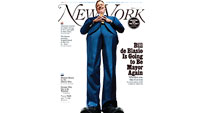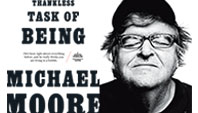 |
1. Bill de Blasio appeared on the latest cover of New York Magazine, along with our prediction that he “is going to be mayor again, whether you like it or not” — an outcome that seemed even more certain after he routed Sal Albanese in the September 12 primary (“In Conversation: Bill de Blasio,” September 4–17). While the cover image raised eyebrows — “I’m going to need some convincing that Andrew Cuomo didn’t design this cover himself,” tweeted BuzzFeed’s Saeed Jones — many weighed in on what the mayor told interviewer Chris Smith. For the New York Times, William Neuman wrote, “Poor Bill de Blasio — so good at being mayor and so misunderstood … As he appears to be cruising toward a likely reelection without strong opponents, [his tone] is remarkably both self-aggrandizing and self-pitying.” Michael Gartland and Danika Fears at the New York Post dismissed de Blasio as “bitter” and responded to his contention that voters aren’t interested in the investigation into his campaign fund-raising: “The vast majority of New York voters — 78 percent — believe he should raise his own money to pay for the lawyers who represented him during the probes — and not take the funds from taxpayers.” And Politico New York’s Dana Rubinstein tweeted, “All de Blasio’s denial of the obviously personal elements of his feud with Cuomo seems counterproductive.” Many seized on a de Blasio quote that demonstrated his (self-professed) “socialistic impulse”: “Our legal system is structured to favor private property.” The Weekly Standard declared “de Blasio sure sounds like a communist,” while Seth Barron at City Journal labeled him “Mayor de Bolshevik.” Some criticism was so fierce, particularly of his remarks about his accomplishments meriting parades, that de Blasio got defensive in a press conference: “I meant very simply that there is a lot of good news in New York City … People should really appreciate how much everyone has achieved together.” Gizmodo Media’s Brendan O’Connor came to his defense, tweeting, “I saw people slagging off de Blasio for this interview but I actually think he comes off great? If he were consistently this cogent I think he’d preempt a lot of criticism, at least from the left.”
 |
2. Jessica Pressler sat down with Michael Moore, the liberal gadfly liberals love to hate (“The Thankless Task of Being Michael Moore,” September 4–17). Thomas W. Benson, co-editor of Michael Moore and the Rhetoric of Documentary, responded, “Jessica Pressler’s story reminds us this sad-sack comic underdog has been right about years of abuse, corruption, neglect, and missed opportunity, and she makes a good case that he may be right again about Donald Trump. Pressler’s description of Moore and Moore’s description of Donald Trump suggest just how much Moore’s and Trump’s personae resemble each other, as if all Moore’s warnings, unheeded, have come home to roost with an opportunist who reverses Moore’s values while appealing to precisely the same nostalgia for a lost America.” But some readers chafed at the filmmaker’s powers of prognostication. Pointing to Moore’sAugust 2012 prediction that Mitt Romney would win, commenter MsFeasance wrote, “You aren’t always right if you just keep guessing the same outcome until the outcome matches your guess.”
3. Taylor Swift’s “Look What You Made Me Do” is the first pure piece of Trump-era pop, Mark Harris argued in the latest issue (“Taylor Swift’s New National Anthem,” September 4–17). “This is the best analytical dissection of where our world is at right now, as expressed through popular culture,” tweeted @MScali2. In Slate’s Culture Gabfest podcast, though, Jody Rosen argued that to “call her Trumpian when you have a confessed sex assaulter in the White House and you have a woman who a court just declared a victim of sexual assault, that seems to me a little clueless.” Harris responded in a Facebook post: “The grounds on which I’m comparing them have nothing to do with sexual assault; rather, I suggest in the piece that we currently live in a culture in which it’s very easy for celebrities to commodify a kind of performative narcissism in which your public persona is defined by an astounding level of self-absorption, particularly in regard to whomever you feel hates you or has treated you badly or is feuding with you … This is not to say that Taylor Swift equals Donald Trump, that they share political positions, or that she supports him.”�